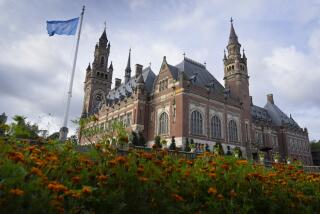U.N. Examines How to Bring Pol Pot to Trial
- Share via
UNITED NATIONS — Responding to reports of the capture of Pol Pot, the man held responsible for Cambodia’s genocidal “killing fields,” U.N. officials began looking Monday for ways he might be brought to trial before an international court.
Advisors to U.N. Secretary-General Kofi Annan were examining at least two options for bringing the Khmer Rouge leader to trial for crimes against humanity, including having the 185-member General Assembly create a new international war crimes tribunal, sources here said.
The 15-member Security Council also could expand the jurisdiction of the existing tribunal, based in the Netherlands, which already is investigating war crimes committed in the former Yugoslav federation and Rwanda. That, however, would risk a potential veto by China, a past sponsor of the Khmer Rouge. China, as one of the five permanent Security Council members, has veto power.
Action by the General Assembly would bypass the possibility of a veto but would require majority support from the member nations.
U.N. sources said Annan is not expected to endorse either option but merely to invite U.N. members to act on a request by Cambodia’s co-prime ministers, Prince Norodom Ranariddh and Hun Sen, “for the assistance of the United Nations and the international community in bringing to justice those persons responsible for the genocide and crimes against humanity during the rule of the Khmer Rouge from 1975 to 1979.”
The prime ministers share power under a U.N.-brokered settlement of the country’s civil war.
They were responding to reports by Gen. Nhek Bunchhay, the government’s chief negotiator with the Khmer Rouge, that Pol Pot was in the custody of mutinous guerrillas. Those reports have not been verified, however, and officials here conceded Monday that they had no confirmation of Pol Pot’s capture.
Over the weekend, Secretary of State Madeleine Albright endorsed the idea of an international trial for Pol Pot, whose regime is blamed for the deaths of more than 1 million people by execution, disease and starvation. His leadership of the Khmer Rouge has been shaken by defections in recent months.
Even if he is in custody, it was apparent Monday that there are serious legal and logistic hurdles to bringing him to court.
In their letter to Annan, the prime ministers said “Cambodia does not have the resources or expertise to conduct this very important procedure.” Although Cambodia might conduct a trial with financial and legal assistance from the U.N. or from other countries, there also is concern that a trial in Cambodia would trigger a resurgence of violence there.
There are also questions of extradition and jurisdiction. At a summit of industrialized nations over the weekend in Denver, Albright asked Canadian Foreign Minister Lloyd Axworthy to consider extraditing Pol Pot to Canada using a Canadian law originally aimed at prosecuting Nazi war criminals hiding in that country. Under this scenario, Pol Pot would be held in Canada pending his trial by an international court.
Officials in Washington said the U.S. is prepared to send a military team to Cambodia to make sure “Pol Pot can be safely and quickly brought to a holding location.”
Although Canadian Prime Minister Jean Chretien directed his government to explore Albright’s request, preliminary research Monday uncovered what one source in Ottawa called “a legal thicket.”
“It looks like Canada’s involvement would be difficult because the legal structure is not in place,” Foreign Ministry spokeswoman Jennifer Ledwidge told reporters.
The law in question was adopted by Parliament a decade ago to prosecute suspected Nazi collaborators who had emigrated to Canada. But it calls for trial in Canadian courts, not an international tribunal, of suspects already living in Canada.
More to Read
Sign up for Essential California
The most important California stories and recommendations in your inbox every morning.
You may occasionally receive promotional content from the Los Angeles Times.










